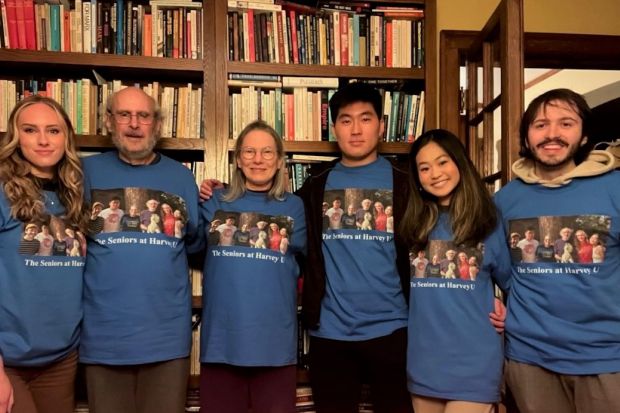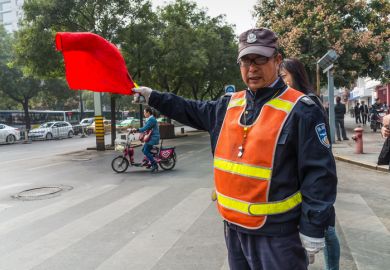For those whose identities are bound up with their professional status, retirement inevitably holds some fear. That is why many academics hold out in their offices as long as possible – even as they lament that the modern academy is a shadow of what it was in their day.
However, my own retirement has allowed me to rediscover some of the spirit of academia in my day. After a period of transition, my life now seamlessly combines new and old responsibilities, activities and relationships. I continue teaching, learning, researching, writing and advising, but contexts – from the physical to the social, cultural and political – have changed.
My primary classrooms now are my dining and living rooms, local porches and sidewalks, and Zoom windows to the world. There are no grades, fees or RateMyProfessor, but my wife and longstanding friends tease me appreciatively that I am now operating Harvey U.
I claim only partial originality. Consciously or otherwise, I model myself on my most original, committed and effective professors and advisers from high school and university, as well as on colleagues who helped to guide me through my 50-year career. These exemplars embrace the value of demonstrating personal interest, making responsible connections, balancing friendship with guidance and hosting end-of-semester potluck and wine-and-cheese events. And, of course, always respecting office hours.
Affirmatively active admission to Harvey U is by invitation. Several members found me online via my publications on critical race theory, book banning, literacy, and my local area, Columbus, Ohio’s university district. But enrolment is more often a result of chance encounter. Several members are neighbours. One helped me find my glasses when I tripped and fell on a broken pavement. Another was seeking help with his online platform to help self-published authors promote their writing. A third was dating my cousin. Some go on to enrol their friends, housemates and classmates. Some are “transferred” to me by colleagues at other universities inside and outside the US (when relevant, I reciprocate).
Other connections are made with servers in local and distant restaurants, or with fellow diners. And some members come via conversations in museums and galleries. Harvey U is expansive. There is no age limit, although most members are in their early twenties. All fields and disciplines are welcome. A background in history, humanities or social sciences (my fields) is much less important than sharing my commitment to the inseparability of teaching and learning and being willing to ask and attempt to answer challenging questions, making connections across time, space, fields and interests.
Class sizes begin with ratios of 1:1, expanding to 1:4-5. Although I organise, initiate and guide, I do not dominate or evaluate (I learned that commandment repeatedly throughout my teaching career). And I insist that I myself must learn as well as teach. After more than eight months of explanation, I almost understand one member’s major field of technical systems engineering. From another, I am learning about naturopathic medicine, her career goal. I also learn from 21-year-olds who read texts differently than I do, as every professor should.
Just as important as interchange between the old professor and the young generation is peer education among the latter – which sometimes proceeds via articulate expressions worthy of a lecturer facing hundreds of students. Issues they’ve discussed include the economics of climate change, the advantages and costs of electric vehicles, and the physical threats to women today.
Often discussions begin with the problems young people have in securing reliable information and interpretations. This typically advances to discussions of strategies for learning and criticising responsibly, including what and how to read. Closely related is the question of how to negotiate, benefit from and succeed in university.
Not surprisingly, writing and communication are regular topics of concern. As a published writer and editor, it is straightforward to guide highly intelligent non-humanities students to more effective modes of expression in everything from course papers to graduate/professional school and job applications. A next step is constructing résumés, about which university student services seem to know almost nothing.
Learning about members’ interests has allowed me to recommend literature and philosophy courses to two engineering students and, in one case, to arrange conversations with three professors before the student made their selection. With many of my unofficial students, I do more to further general education and interdisciplinarity than the formal curricular requirements and paid non-professorial advisers who dominate today.
Some of our most compelling conversations centre on planning for the years immediately following graduation: the challenge of postgraduate education versus full-time employment, internships versus gap years of service or travel.
Contemporary young people confront one of the most challenging periods for coming of age in documented history. There is unprecedented pressure to choose a “profitable” major, complete a degree and find a job. Yet mental health is declining, making charting a course through university harder. Opportunities to engage peers and professors outside shared classrooms and residences are too rare. And many faculty and almost all student services offices are far less attentive to students’ basic needs than they once were.
Harvey U is only one example of how committed professors – not all necessarily retired – may respond. I ask others to consider establishing their own kindred institutions. There is no financial compensation, but the rewards are incalculable.
Harvey J. Graff is professor emeritus of English and history at The Ohio State University and inaugural Ohio Eminent Scholar in Literacy Studies. His most recent book is Searching for Literacy (2022).




